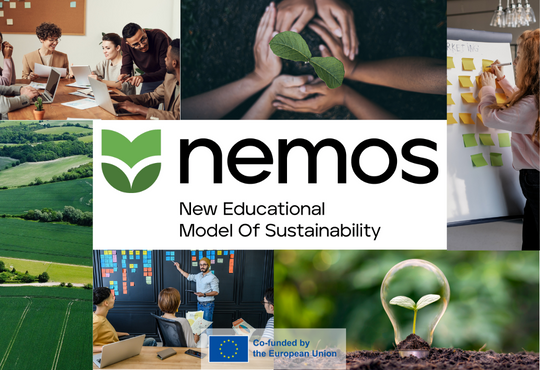IGCAT is a consortium partner in the Erasmus+ project NEMOS – A new educational model for acquisition of sustainability competences through service learning.
Launched in February 2022, the NEMOS project acknowledges sustainability as an increasingly crucial skill for graduate and post-graduate students to tackle important global challenges such as climate change, food waste and the loss of biodiversity in their professional future.
Therefore, the project aims to define a new educational model to integrate sustainability competences in the curricula of food-related degrees by means of service learning.
In practice, by developing a Food Sustainability Profile for students and a methodological handbook, NEMOS will create a guidance framework, toolkits and educational practices patterns for the acquisition of sustainability competences through green pedagogies and service learning.
The ultimate aim will be to contribute to the achievement of the UN’s Sustainable Development Goals 2 (“end hunger, achieve food security and improved nutrition, and promote sustainable agriculture and farming”) and 12 (“responsible production and consumption”) by raising awareness of sustainability issues among the project’s main target groups: students, teachers and HEIs in general, stakeholders in the concerned communities.
Co-funded by the Erasmus+ programme of the European Union, the NEMOS project is led by the Public University of Navarra and includes the following consortium partners: Technological University Dublin (Ireland); Technological University Graz (Austria); Rhône-Alpes Higher Institute of Agriculture (France); University of Pisa (Italy); and IGCAT.
The kick-off meeting of the project took place on 11-12 April 2022 in Pamplona, hosted by the Public University of Navarra, where partners discussed the strategy and tools to develop Food Sustainability Profile for students as the first project result.
About IGCAT
IGCAT aims to empower local communities by raising awareness of the importance to protect and promote distinct regional food, culture, arts and natural assets as part of sustainable and balanced tourism and development strategies. This is essential to safeguard our planet, health, wellness and local economies.
IGCAT is a non-profit institute established in 2012, working with regional stakeholder consortiums in the fields of gastronomy, culture, arts and tourism. It counts on the expertise of a worldwide network of experts and works in partnership with specialised intergovernmental organisations.
IGCAT founded the World/European Region of Gastronomy Award and is the official secretariat for the World/European Regions of Gastronomy Platforms. Furthermore, the Institute has developed the European Young Chef Award, the World Food Gift Challenge, the Top Websites for Foodie Travelers Award and the international Food Film Menu.
About the World/European Regions of Gastronomy
Candidate and awarded World/European Regions of Gastronomy, guided by IGCAT, are working together to strengthen food security through the celebration of distinctive food cultures; create employment by stimulating creativity and gastronomic innovation; nourish children and adults through culinary and cultural education; drive environmental sustainability in tourism, hospitality and agricultural sectors; support balance and sustainable tourism practices; highlight and support expertise from within rural and urban communities, creating connections and sharing good practises; and contribute to community health and well-being.
31 May 2022
